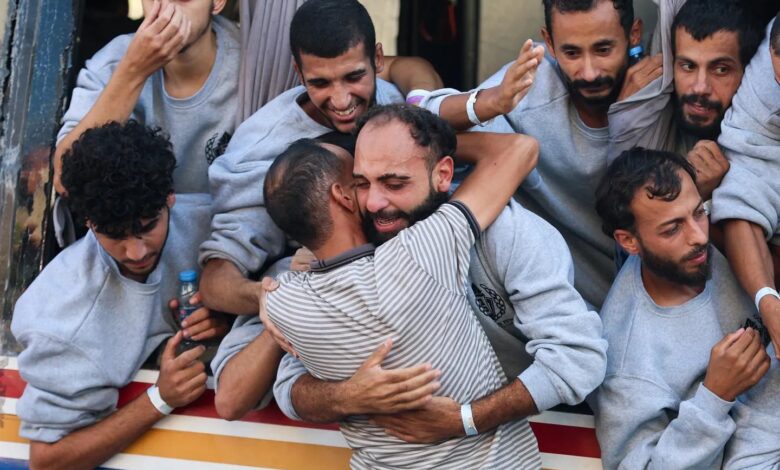“We Were in Slaughterhouse”: What Freed Palestinian Detainees Are Saying After Release From Israeli Prisons

Occupied Palestine (QNN)- Palestinian detainees freed from Israeli jails on Monday under the Gaza ceasefire agreement once again showed signs of torture and starvation.
Israel released 1,968 Palestinian abductees on Monday, as part of the latest exchange deal with the Palestinian resistance in Gaza. Among them were 250 serving life sentences and 1,718 hostages from Gaza who were kidnapped during Israel’s recent genocide campaign.
“Beaten and Humiliated”
The freed Palestinians said they were beaten and humiliated, describing the Israeli prisons they were held in as “slaughterhouses”.
Al Jazeera correspondent Ibrahim al-Khalili’s brother, Mohammed, who was held for more than 19 months without charge, described his ordeal as a “big struggle”.
“We were beaten and humiliated. We suffered a lot. But thank God, it’s all over now,” al-Khalili said.
Abdallah Abu Rafe described his release as a “great feeling”.
“We were in a slaughterhouse, not a prison. Unfortunately, we were in a slaughterhouse called the Ofer prison. Many young men are still there. The situation in the Israeli prisons is very difficult. There are no mattresses. They always take the mattresses away. The food situation is difficult. Things are difficult there,” he said.
Another released detainee, Yasin Abu Amra, described conditions in Israeli jails as “very, very bad”.
“In terms of the food, the oppression, and the beatings, everything was bad. There was no food or drink. I hadn’t eaten for four days. They gave me two sweets here, and I ate them,” he said.
Saed Shubair, who was also freed on Monday, said he did not know how to describe his feelings.
“The feeling is indescribable,” he said. “Seeing the sun without bars is an indescribable feeling. My hands are free from the handcuffs. Freedom is priceless.”
In the occupied West Bank city of Ramallah, freed Palestinian prisoners were met by a cheering crowd so dense they struggled to get off the bus that delivered them from jail.
“It’s an indescribable feeling, a new birth,” said Mahdi Ramadan, flanked by his parents after his release from prison.
Palestinian journalist prisoner Shadi Abu Seed has given a harrowing account of life inside an Israeli prison after his release.
“I went hungry for the past two years. I swear to God, they didn’t feed us. They kept us naked. They beat us while we were naked day and night. We were tortured,” Abu Seed said.
“Until our last day in Israeli prison, they cut us and hit us and abused us. We endured every kind of torture, emotional and physical.”
“We couldn’t even sleep. They threatened us with our children. They told me they killed my children. They told us that Gaza was destroyed. I arrived here and found that everything was gone. It looked like the end of the world. Everything is different.”
Journalist Shadi Abu Seido, who was kidnapped by Israeli forces from Gaza, entered prison hungry and left hungry.
He was subjected to torture, stripping, and threats against his children… to this day, the marks of pain remain on his body and mind. This is the reality of… https://t.co/cNBdxiEDbw pic.twitter.com/RWNVqAf4A2
— Quds News Network (@QudsNen) October 13, 2025
“He’s been locked up for 24 years,” said a relative of Saber Masalma, who was arrested in 2002 and sentenced to life in prison. “He looks like a dead body. But we will bring him back to life,” he said.
Palestinians have faced abuse and inhumane treatment in Israeli prisons “as a matter of policy” according to the Israeli human rights organisation B’Tselem. The group says that Palestinian detainees are denied medical treatment, adequate food and face physical abuse in Israeli prisons.
According to Palestinian prisoner advocacy groups, every time prisoners are released, the prisoners’ bodies reflect the level of crimes committed against them, including torture that is “unprecedented” in its level after October 7, “starvation crimes, systematic medical crimes, and the infection of a number of them with scabies, in addition to the severe beatings that the prisoners were subjected to before their release.”




